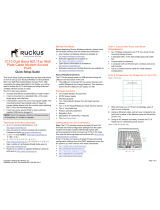
Copyright © 2009 Ruckus Wireless, Inc.
Published September 2009, Part Number 800-70242-001 REV A
STEP 4: CUSTOMIZE THE WIRELESS SETTINGS
1 Log in to the ZoneFlex Web interface.
For single band AP (ZoneFlex 7343):
• On the Web interface menu, click Configuration > Wireless.
The Configure::Wireless::Common options appear.
• Verify that the following options are active:
• Wireless Mode: Auto-select
• Channel: SmartSelect
• Country Code: If you are not located in the United
States, select your current country.
For dual band AP (ZoneFlex 7363):
• On the Web interface menu, click Configuration > Radio
2.4G
or Configuration > Radio 5G.
• Verify that the following options are active:
• Wireless Mode: Radio 2.4G or Radio 5G
• Channel: SmartSelect
• Country Code: If you are not located in the United
States, select your current country.
2 Click Update Settings if you made any changes.
3 Click any of the “Wireless #” tabs near the top of the
screen.
4 In Wireless Availability, click Enabled.
5 Delete the text in the SSID field, and then type the name
of your network. If your network does not have a “name”,
type a short name that will help your users identify the AP
in their wireless network connection application.
6 Click Update Settings to save your changes.
7 Repeat Steps 4-7 for each Wireless # interface that you
want to enable.
8 Click Logout to exit the Ruckus Web Admin interface.
9 When the Web Admin login page reappears, you can exit
your browser.
10 Disconnect the AP from the computer and from the cur-
rent power source, and then restore your computer to the
normal network connections.
STEP 5: RESTORE YOUR COMPUTER’S NETWORK
S
ETTINGS
1 Click Start > Settings > Network Connections.
(If Windows 2000, click Start > Settings > Network and
Dial-up Connections.)
2 When the Network Connections window appears, right-
click the icon for the “Local Area Connection” designated
for your home network and choose Properties.
3 When the Local Area Connection Properties dialog box
appears, select Internet Protocol (TCP/IP) from the scroll-
ing list, and click Properties.
The TCP/IP Properties dialog box appears.
4 Replace the recent AP connection entries with the entries
from your standard network configuration.
5 Click OK to save your settings and exit first the TCP/IP
Properties dialog box, then the Local Area Connection
Properties dialog box.
Your computer is now ready for normal network use.
STEP 6: PLACE THE AP IN YOUR SITE
1 Disconnect the AP’s power adapter from the power outlet (or
disconnect the PoE cable).
2 Move the AP to its permanent location (accessible to both
AC power and network connections).
3 Use an Ethernet cable to connect the 10/100 or 10/100/
1000 port of the AP to the appropriate device:
• The ISP’s modem or gateway device
• The Ethernet switch that is connected to the ISP’s
device
4 If not using Power over Ethernet, connect the AP power
adapter to the AP, then to a convenient power source.
5 Verify that the Ethernet port LED is lit.
After a short pause to re-establish the Internet connection, you
can test the AP.
STEP 7: VERIFY THE INSTALLATION
1 Using any wireless-enabled computer or mobile device,
search for and select the wireless network you’ve previously
configured.
2 If you can connect, open a browser and link to any public
Web site.
Congratulations! Your wireless network is active and ready for
use.
FOR MORE INFORMATION
You can now use the wireless network to log into the AP’s Web
interface. Use the Web interface to review and fine-tune a
wide range of AP settings.
For information on how to configure the AP from the Web
interface, refer to the online help.
IF YOUR COMPUTER CANNOT CONNECT TO THE AP
• Disconnect the AP from the power source, wait 5 seconds,
then reconnect it—and wait 60 seconds before attempting a
reconnection.
• Disconnect and reconnect the AP and the computer.
• Replace the Ethernet cable with a new one if the relevant
LAN port LED is not illuminated. (LEDs in each port light up
during a successful connection.)
NOTE:
If you anticipate logging into the AP regularly to perform
monitoring or maintenance (once it is in place), you may
want to consider assigning a static IP address to the AP.
In a default AP configuration, the AP uses a DHCP-assigned
IP address. Any post-installation connections require (1) a
reverse ARP lookup or (2) logging into the DHCP server, to
determine which IP address is in effect in the AP.
See the Ruckus Wireless Access Point User Guide for more
information on IP address assignment options and logging
into the AP through either a static IP or dynamic IP address.
OPTIONAL: IF YOU WANT TO SWITCH FROM DHCP
(DEFAULT)
A. On the menu, click
Configuration > Internet.
B. Click the
Static IP option.
C. Fill in the
IP Address and Mask fields.
D. Click Update Settings to save your changes.
TIP
Follow these guidelines to maximize wireless signal
performance:
• Place the AP as close to the center of the room, and away
from any physical obstructions, as possible.
• Place the AP on a shelf or other elevated location where the
user’s wireless networking devices are in line-of-sight
access.
• Avoid any sources of electromagnetic interference.
• Avoid placing the AP near large metal or glass surfaces.





